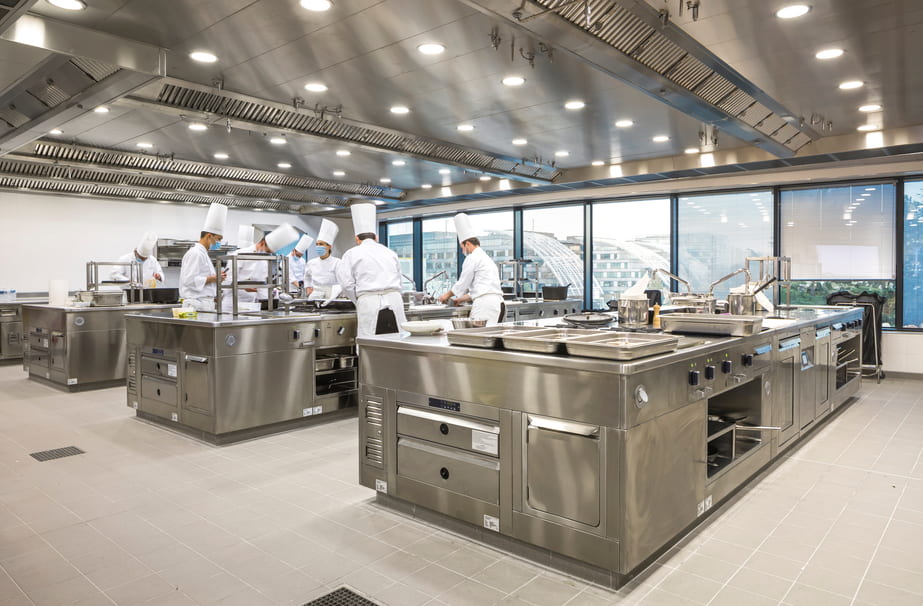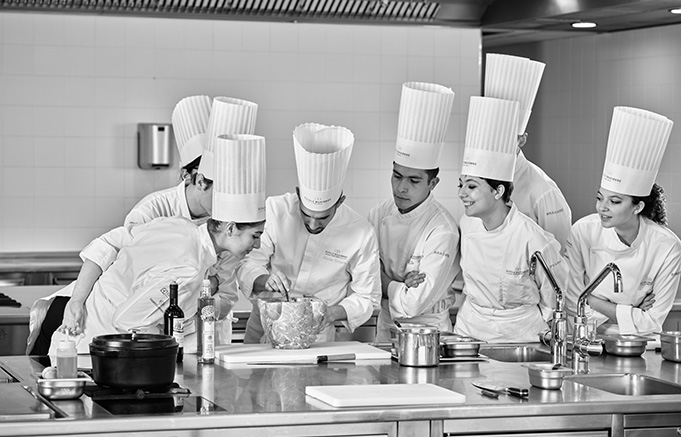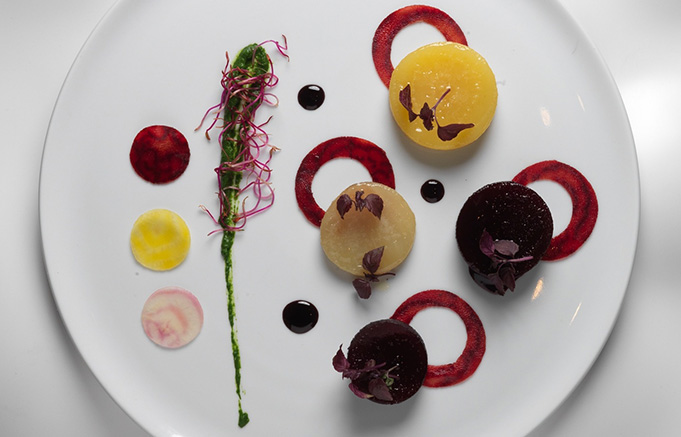What can you do with a culinary degree

Culinary degrees are a great first step to becoming a professional chef - and they can open up other opportunities too. Find out more here.
What Can You Do With a Culinary Arts Degree?
While a culinary arts degree can open up a whole world of exciting careers in some of the best restaurants and hotels around the world, it can also unlock other opportunities in the gastronomic sector.
Of course, the majority of culinary arts graduates go on to become full-time chefs, but there are many other culinary careers you can pursue with a culinary arts degree.
From nutritionist to food stylist and pastry chef to executive chef, there are a whole host of job options out there for those with a culinary education.
Jobs with a culinary degree

Beyond becoming a professional chef, a culinary arts program can be the gateway to other exciting roles in the industry too.
Here are some of the alternative career paths chosen by students of the culinary arts.
- Entrepreneur – become a restaurateur or start your own catering company or even chef training academy using the skills, knowledge and techniques you learn on a culinary arts program.
- Restaurant manager – the administrative and business skills you will learn on a culinary arts degree program will set you up nicely for restaurant management as will your knowledge of gastronomy.
- Food & Beverage manager – high-end hotels are always on the lookout for professionals with a mix of culinary and management training to run their F&B offerings.
- Events & catering manager – you could easily deploy the top-notch culinary skills and business knowledge you acquire on a culinary program in an events or catering context.
- Franchise manager – a culinary arts program can set you up to successfully manage a food franchise thanks to the broad range of skills you will learn, including accounting, finance and marketing.
- Product development manager – your inventiveness and finely developed palate will be major assets in the food industry as a product development manager, where you will get to create new products on an industrial scale.
- Manager in the food industry – with an in-depth knowledge of food and a firm grasp of management, marketing and sales, you could move into a managerial role in the food industry.
- Culinary consultant – work with other chefs to help them devise a new menu, create exciting new dishes, upgrade their kitchens with the latest equipment or work smarter.
What Kind of Accreditation Should My Degree Program Have?
If you’re considering a culinary arts degree program, it’s crucial you choose the right culinary school - and essential to check that the culinary institution is accredited.
Without an accreditation from a recognized academic association, you cannot be completely confident in your culinary school.
Accreditation guarantees the teaching has been independently assessed and verified as being of a certain standard, so always check before you apply.
Accreditation will also reassure future employers that you have been taught the right skills and classical cooking techniques by qualified faculty, which will make it much more likely you will land a job on graduation.
Accreditation bodies such as Qualiopi, which certifies schools such as Ecole Ducasse in France, certify training and skills development service providers for quality using qualified internal and external auditors.
Certification is only valid for three years, so institutions must maintain and improve their standards if they are to gain reaccreditation.
But it’s not just a question of checking accreditation. If you’re set on attending a culinary school, you need to look at other factors too, including:
- The history of the school - if the culinary school has a long history or if it has been established by a top chef, it’s more likely to have an enviable track record of turning out high-quality graduates. It’s also worth looking at its reputation among the big-hitters in the culinary industry.
- The quality of the faculty - schools that employ master chefs, artisan bakers and high-end pastry chefs offer the best culinary arts education and give you the added benefit of their expertise. It’s also worth checking the student-to-faculty ratio so you get the attention and guidance you need.
- The course content - make sure you’re learning all the techniques and culinary skills you will need and look out for a combination of academic study and practical, hands-on learning. The best schools also offer courses in business and management techniques that prepare you for leadership in the culinary world.
- Contacts with the industry - a well-connected school is much more likely to be able to place you in a high-end restaurant for an internship, which will give you the kind of valuable work experience with the right standard of employer you’ll need to give you the edge.
- The alumni - also ask former students where they work. A school with a good alumni network with lots of graduates working in high-profile roles is likely to give you a distinct advantage when it comes to looking for your first role.

Ecole Ducasse, a new benchmark in gastronomy education
Since 1999, Ecole Ducasse has been a leader in culinary arts education, drawing on Chef Alain Ducasse’s uncompromisingly high standards, flair and culinary philosophy.
What Kinds of Culinary Arts Degrees Are There?
There are culinary arts programs of different lengths for people at all stages of life, from high-school leavers and graduates to ambitious hobbyists and career switchers.
Most culinary institutions will offer a range of culinary courses. Here are the usual options:
- Bachelor’s in Culinary Arts - generally taught over three years and including at least one internship, Bachelor’s degree programs in culinary arts will teach you the fundamentals of gastronomy in the classroom and in practical workshops while also developing your business, communication and kitchen management skills.
- Diploma in Culinary Arts - covering a variety of cuisines, with a strong focus on managerial and entrepreneurial skills and feature a high proportion of practical learning. Diplomas are designed to give you an essential toolbox of skills and business acumen that will equip you for serious culinary careers.
- Culinary Arts Essentials course - these provide a great opportunity to learn the ropes. Typically lasting around 10 weeks, these immersive programs teach students the fundamentals of French cuisine, how to source the best produce, food preparation and how to cook ingredients.
When choosing which course is right for you, there are plenty of other factors to consider. Among these are:
- Industry experience - check whether you will be exposed to the culinary industry as part of the course as this is a great way of making connections as well as learning the ropes.
- Faculty quality - if you want to be the best, you have to learn from the best, so make sure the faculty are experts in their field
- Course content - read up on what you will be learning to make sure it covers what you will need to know. Practical as well as academic content is a must.

What Courses Will I Take in a Bachelor's Program?
If you have chosen to study a culinary program at Bachelor level, your course will cover a broad range of topics and skills. Among these are:
- Fundamental culinary techniques – how to chop, slice, peel, braise, sautée and more. You may even learn how to make pastries, desserts and other confectionery.
- Presentation – plating and presentation skills, from selecting the right plate and garnishing to those essential last touches before the dish leaves the kitchen.
- Food science – the science behind cooking, how food changes when cooked and how to apply different techniques and technologies to deliver new and exciting flavor sensations.
- Food safety - essential knowledge of food handling, storage, hygiene and other health and safety considerations in food service.
- Life and business skills – you will also learn a range of essential ‘soft’ skills such as time management, discipline and communication alongside business fundamentals such as accounting, finance and budgeting to marketing, strategy and procurement.
The better Bachelor’s degree courses will also include at least one internship in a high-end restaurant. Essential in the hospitality industry, internships give you:
- the opportunity to test what you have learned in a real-world context
- experience of working under pressure
- great industry connections.
Master the culinary arts with a Bachelor’s at Ecole Ducasse
Expert faculty, great industry connections and a Michelin-starred philosophy make the Ecole Ducasse Bachelor degree in culinary arts - one of the best around



